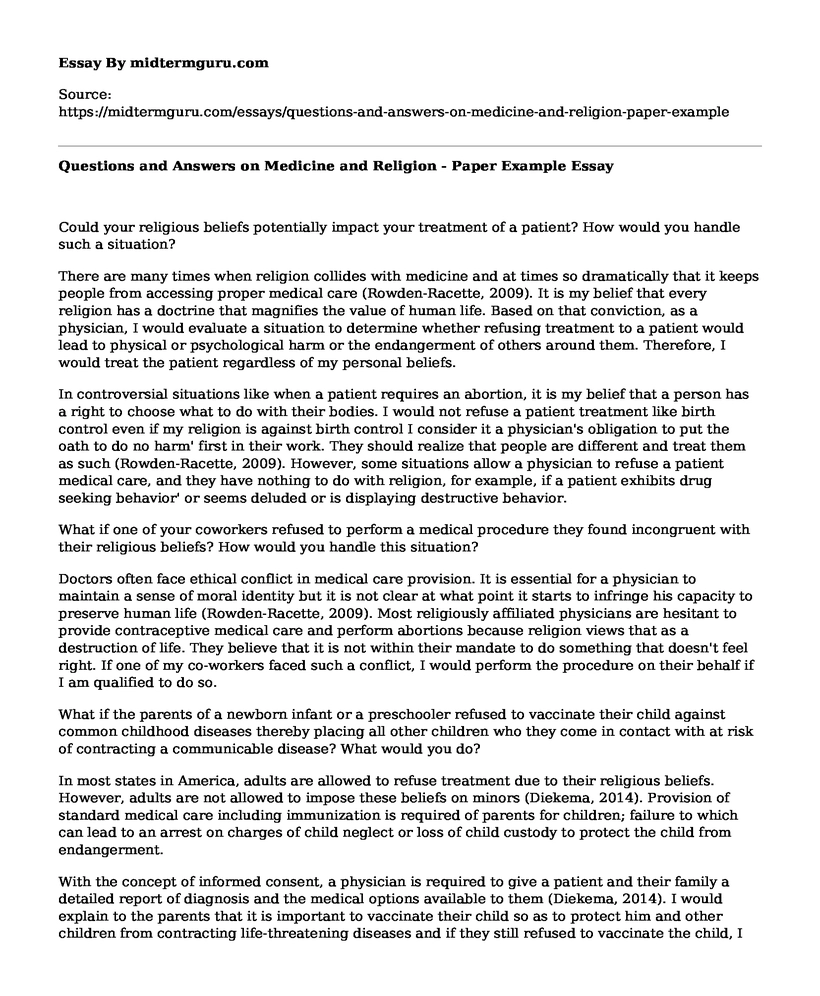Could your religious beliefs potentially impact your treatment of a patient? How would you handle such a situation?
There are many times when religion collides with medicine and at times so dramatically that it keeps people from accessing proper medical care (Rowden-Racette, 2009). It is my belief that every religion has a doctrine that magnifies the value of human life. Based on that conviction, as a physician, I would evaluate a situation to determine whether refusing treatment to a patient would lead to physical or psychological harm or the endangerment of others around them. Therefore, I would treat the patient regardless of my personal beliefs.
In controversial situations like when a patient requires an abortion, it is my belief that a person has a right to choose what to do with their bodies. I would not refuse a patient treatment like birth control even if my religion is against birth control I consider it a physician's obligation to put the oath to do no harm' first in their work. They should realize that people are different and treat them as such (Rowden-Racette, 2009). However, some situations allow a physician to refuse a patient medical care, and they have nothing to do with religion, for example, if a patient exhibits drug seeking behavior' or seems deluded or is displaying destructive behavior.
What if one of your coworkers refused to perform a medical procedure they found incongruent with their religious beliefs? How would you handle this situation?
Doctors often face ethical conflict in medical care provision. It is essential for a physician to maintain a sense of moral identity but it is not clear at what point it starts to infringe his capacity to preserve human life (Rowden-Racette, 2009). Most religiously affiliated physicians are hesitant to provide contraceptive medical care and perform abortions because religion views that as a destruction of life. They believe that it is not within their mandate to do something that doesn't feel right. If one of my co-workers faced such a conflict, I would perform the procedure on their behalf if I am qualified to do so.
What if the parents of a newborn infant or a preschooler refused to vaccinate their child against common childhood diseases thereby placing all other children who they come in contact with at risk of contracting a communicable disease? What would you do?
In most states in America, adults are allowed to refuse treatment due to their religious beliefs. However, adults are not allowed to impose these beliefs on minors (Diekema, 2014). Provision of standard medical care including immunization is required of parents for children; failure to which can lead to an arrest on charges of child neglect or loss of child custody to protect the child from endangerment.
With the concept of informed consent, a physician is required to give a patient and their family a detailed report of diagnosis and the medical options available to them (Diekema, 2014). I would explain to the parents that it is important to vaccinate their child so as to protect him and other children from contracting life-threatening diseases and if they still refused to vaccinate the child, I would alert the local child protection agency. Parents being a child's natural guardians should seek the child's best interest. It is not okay for a parent to knowingly endanger the life of their child or other children. Such a parent should be arrested and fined and their child forcefully vaccinated.
References
Diekema, D. S. (2014). Parental Decision Making: Ethical Topic in Medicine. Retrieved from https://depts.washington.edu/bioethx/topics/parent.html
Rowden-Racette, K. (2009). When Religion and Medicine Collide | Physicians Practice. Retrieved from http://www.physicianspractice.com/articles/when-religion-and-medicine-collide
Cite this page
Questions and Answers on Medicine and Religion - Paper Example. (2021, Jun 25). Retrieved from https://midtermguru.com/essays/questions-and-answers-on-medicine-and-religion-paper-example
If you are the original author of this essay and no longer wish to have it published on the midtermguru.com website, please click below to request its removal:
- Paper Example on Physician-Assisted Suicide and Hospital Policy
- The Health Problem for the Population - Paper Example
- Essay Sample on Supplemental Nutrition
- PEN-3 Model: A Comprehensive Approach to Health Challenges - Essay Sample
- Can We Win the War Against Cancer? A Look at the Growing Crisis - Research Paper
- Understanding Internal vs. External Evidence in Nursing - Research Paper
- Opioid Addiction: A Growing Epidemic in the US - Essay Sample







